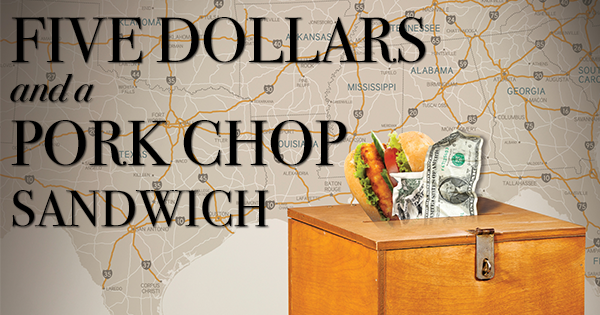Five Dollars and a Pork Chop Sandwich
Read an excerpt from Mary Frances Berry’s new book about vote buying

It might be 2016, but vote buying and selling are alive and well in America’s shining democracy. A study funded by the Carnegie and Knight foundations—“Who Can Vote?”—found 2,068 documented cases of criminally prosecuted electoral fraud between 2000 and 2012. And as Mary Frances Berry writes, “Most criminal complaints are not prosecuted, and those that go to trial are often unreported.”
Her new book, Five Dollars and a Pork Chop Sandwich, is an attempt to report on the kinds of electoral fraud that still run rampant in our country and occur across party lines: vote buying, vote hauling, and the abuse of absentee ballots. As the 2016 presidential election looms, so too do threats to fair and free voting. Read this excerpt about the beginnings of Louisiana’s Voter Fraud Division, founded in 2000 by the state’s commissioner of elections, Suzanne Haik Terrell, and first led by Greg Malveaux.
The hotline of the Voter Fraud Division received hundreds of mostly anonymous complaints from all over the state soon after Terrell announced its formation. People seemed eager to report corruption, even without the promise of a future reward. Some appeared to be do-gooders and others were candidates for local office who had lost in the 1999 election that had put Terrell in office. The complaints went directly to Malveaux’s office. …
Malveaux’s office would confront every type of electoral fraud known to man during the four years he headed the Fraud Division. Their investigations frequently elicited anger and violence. Few of their cases involved voter impersonation, the familiar target of Republican voter identification laws. Instead, they would see hundreds of complaints of vote buying or unlawful voter registration and other violations of the state’s election law. Registrars routinely reported vote buyers, who submitted registration forms from convicted felons who were disfranchised under state law. There were also reports of vote haulers who brought out-of-parish residents to register and vote, and payroll padding with precinct workers who were paid to work and didn’t appear. Malveaux discovered that Democrats, Republicans, and political independents engaged in voter fraud. Distressingly, poor people were often the targets of vote buyers. Though the poor are with us everywhere, tenants in public housing developments were especially targeted, sometimes with an implied threat of eviction if they failed to sell their votes. In some communities, vote buyers—some of them wearing law enforcement uniforms—made paid calls on the neighborhoods where poor and working-class people lived. …
From all of the complaints received, the division investigated about two hundred cases during its first year. Malveaux was astounded by the embedded culture of corruption he encountered in town after town, parish after parish. By the September 1, 2000, the first arrests had been made, seven involving convicted felons on probation or parole registering to vote in the 1999 elections. Terrell told the Monroe, Louisiana, News Star, “Elections have to be above board. . . . For years with what we’ve allowed to go on people have lost faith in the election process.”
Excerpted from Five Dollars and a Pork Chop Sandwich: Vote Buying and the Corruption of Democracy by Dr. Mary Frances Berry (Beacon Press, 2016). Reprinted with permission from Beacon Press.

